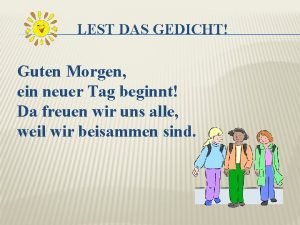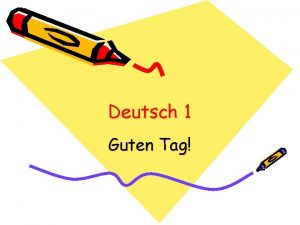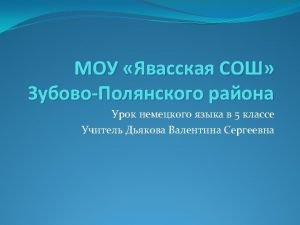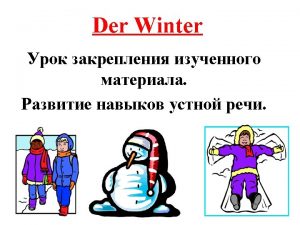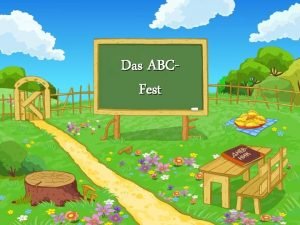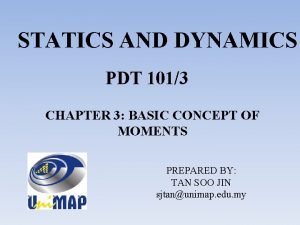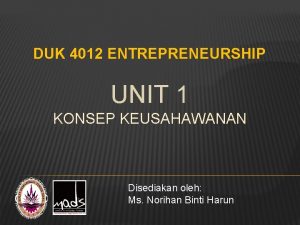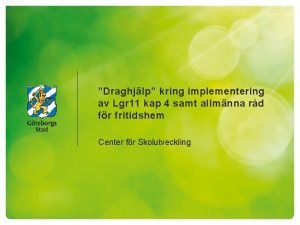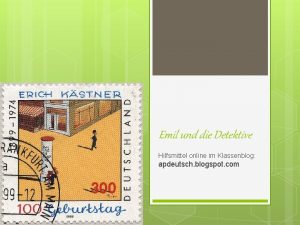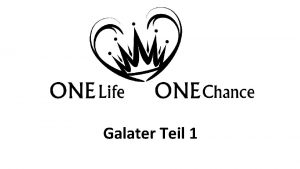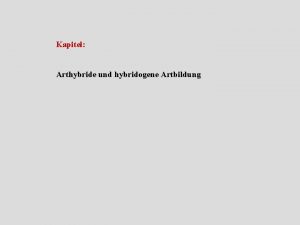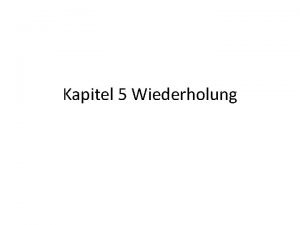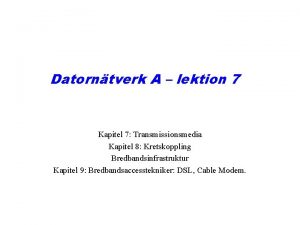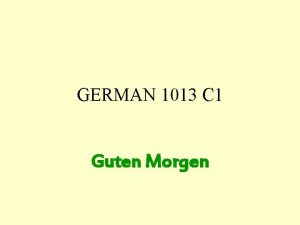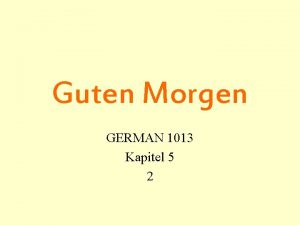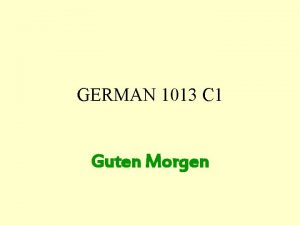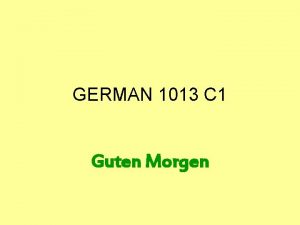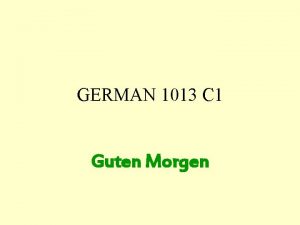GERM 1013 Guten Morgen GERMAN 1013 Kapitel 5



![Till: Hallo. Wie heißt du? Nina: Ich heiße Nina. Was [Wie] ist dein Name? Till: Hallo. Wie heißt du? Nina: Ich heiße Nina. Was [Wie] ist dein Name?](https://slidetodoc.com/presentation_image_h2/8081c69de5e8bda0a16f3abc45a676bc/image-4.jpg)















- Slides: 19

GERM 1013 Guten Morgen

GERMAN 1013 Kapitel 5 1

Till: Hallo. ____ heißt du? Nina: Ich heiße Nina. _____ ist dein Name? Till: Ich bin Till. Nina: _____ alt bist du, Till? Till: Ich bin 20. Und du? Nina: Ich bin 19. Ich bin Studentin. Bist du Student? Till: Ja, ich studiere hier Deutsch und Englisch. _____ studierst du? Nina: Ich studiere Psychologie, aber nicht hier. Ich besuche meine Schwester. Till: _____ studierst du? Nina: Ich studiere an der Uni Hamburg. Till: _____ findest du Hamburg? Nina: Hamburg ist sehr hektisch, aber schön. Kommst du aus Freiburg? Till: Nein, ich bin aus Köln. Meine Eltern wohnen noch dort. ______ kommst du? Nina: Ich komme aus Kiel. _____ lange studierst du schon? Till: Sechs Semester und du? Nina: Vier Semester. Ich muss jetzt leider den Bus nehmen. Till: ______ fährst du? Nach Hamburg? Nina: Ja. Till: Oh, schade. _____ fährt dein Bus?
![Till Hallo Wie heißt du Nina Ich heiße Nina Was Wie ist dein Name Till: Hallo. Wie heißt du? Nina: Ich heiße Nina. Was [Wie] ist dein Name?](https://slidetodoc.com/presentation_image_h2/8081c69de5e8bda0a16f3abc45a676bc/image-4.jpg)
Till: Hallo. Wie heißt du? Nina: Ich heiße Nina. Was [Wie] ist dein Name? Till: Ich bin Till. Nina: Wie alt bist du, Till? Till: Ich bin 20. Und du? Nina: Ich bin 19. Ich bin Studentin. Bist du Student? Till: Ja, ich studiere hier Deutsch und Englisch. Was studierst du? Nina: Ich studiere Psychologie, aber nicht hier. Ich besuche meine Schwester. Till: Wo studierst du? Nina: Ich studiere an der Uni Hamburg. Till: Wie findest du Hamburg? Nina: Hamburg ist sehr hektisch, aber schön. Kommst du aus Freiburg? Till: Nein, ich bin aus Köln. Meine Eltern wohnen noch dort. Woher kommst du? Nina: Ich komme aus Kiel. Wie lange studierst du schon? Till: Sechs Semester und du? Nina: Vier Semester. Ich muss jetzt leider den Bus nehmen. Till: Wohin fährst du? Nach Hamburg?

Wer kommt woher? • • • Wie heißt du? Woher kommst du? Wo wohnst du? Wie alt bist du? Was machst du? – Was studierst du?

Guten Tag, wie gehts? • • • Wie heißt du? Woher kommst du? Wo wohnst du? Wie alt bist du? Was machst du? – Was studierst du? • • • Ich heiße. . . Ich komme aus. . . Ich wohne in. . . Ich bin. . . (Jahre alt) Ich bin (Arzt/in …) – Ich bin Student/in – Ich studiere … Das ist … Er/Sie kommt aus … Er/Sie wohnt in … Er/Sie ist … Jahre alt. Er/Sie ist … Er/Sie studiert …

AKKUSATIV

terminology • Word types: – nouns, pronouns, verbs, adjectives, prepositions … • Functions: – subject, predicate, object … • Form (case) : – nominative, accusative, dative, genitive – (subject case / direct object case / indirect object case / possessive case)

terminology • Word types: – coat / I / he / to buy / for / a / new • Functions: – I buy a new coat for him. – He buys a new coat for me. • Form (case) : • subject = he / I = nominative • object = him / me = accusative

What are Objects Peter sleeps. Children play. Ingrid wants an answer She sent us a letter. He works for his uncle Paula reads a book. Paula reads what? A book is the direct object. They are inviting Paula and her sister. They are inviting whom? Paula and her sister are two direct objects.

They are inviting Paula and her sister. They are inviting Paula and [ I or me? ] They are inviting Paula and me. Paula and [ I or me? ] are going to the party. Paula and I are going to the party.

AKKUSATIV He brings her home. She brings him home. Er bringt sie nach Hause. Sie bringt ihn nach Hause

AKKUSATIV Peer buys christmas presents. Peer kauft Weihnachtsgeschenke. Nina buys a blouse a book a sweater Nina kauft eine Bluse ein Buch einen Pullover

AKKUSATIV • article words of masculine nouns: • der = den • diesen / welchen jeden • ein = einen • keinen / meinen / deinen / seinen / ihren / unseren / euren / ihren • personal pronouns • ich = mich • du = dich • er = ihn sie = sie / es = es • wir = uns • ihr = euch sie = sie

AKKUSATIV • • • bis durch für gegen ohne um • Ich lerne bis nächsten Mittwoch. • Ich gehe durch den Park. • Er arbeitet für seinen Onkel. • Er ist gegen diesen Politiker. • Sie kommt ohne ihren Freund. • Wir laufen um den Marktplatz

AKKUSATIV • direct object • object of the prepositions: bis durch für gegen ohne um • effects: – article words (and adjectives) of masculine nouns – personal pronouns

WHO buys WHAT for WHOM • WHO buys WHAT for • subject (direct) object WHOM object of prep. • WER kauft WAS für • nominative accusative WEN accusative

WHO buys WHAT for WHOM • My mother buys a coat for her sister • WER kauft WAS für WEN • Meine Mutter kauft einen Mantel für ihre Schwester

Homework • Kapitel 5 – Seite 11 - Übung 1 – Seite 13 - Übung 6 – prepare (read, practise, translate) first dialogue (Geburtstagsgeschenke) [K 5, p. 2] • ==> on-line homework 1 - 3 Tschüß
 Wir haben für morgen ein gedicht
Wir haben für morgen ein gedicht Guten tag wie heißen sie
Guten tag wie heißen sie Guten morgen frau schmidt
Guten morgen frau schmidt Es ist kalt es ist kalt flocken fallen nieder
Es ist kalt es ist kalt flocken fallen nieder Guten morgen freitag 1 april
Guten morgen freitag 1 april Guten morgen christmas
Guten morgen christmas Guten morgen ruft die sonne
Guten morgen ruft die sonne Hase guten morgen
Hase guten morgen Guten tag hallo wie gehts
Guten tag hallo wie gehts Low german vs high german
Low german vs high german 400sin30
400sin30 Konsep keusahawanan
Konsep keusahawanan Meredith nelson dan neck 1982
Meredith nelson dan neck 1982 Lgr 11 kapitel 4
Lgr 11 kapitel 4 Emil und die detektive kapitel 12 zusammenfassung
Emil und die detektive kapitel 12 zusammenfassung Brief an die galater kapitel 6
Brief an die galater kapitel 6 Iso 9001 kapitel 8
Iso 9001 kapitel 8 Arthybride
Arthybride Good pizza great pizza kapitel 3
Good pizza great pizza kapitel 3 The australian connection zusammenfassung kapitel 7
The australian connection zusammenfassung kapitel 7
